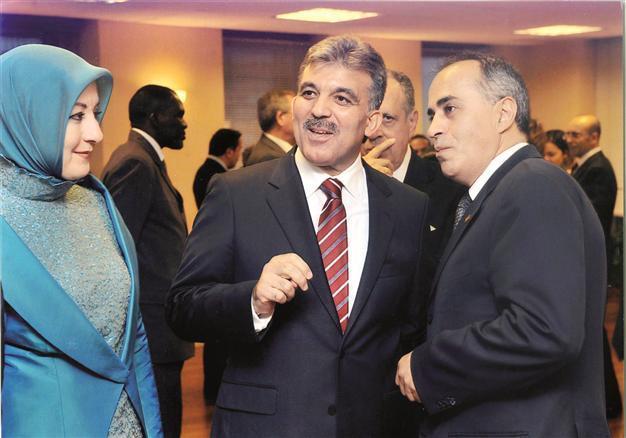Book reveals Erdoğan-Gül conflicts in foreign policy
Ali Kayalar – ISTANBUL

A much-awaited new book by Ahmet Sever, the 12-year ally of former president Abdullah Gül, leaves no doubt that tension between Gül and current President Recep Tayyip Erdoğan rose on several occasions, peaking after the corruption allegations arose against the latter’s former ministers in December 2013.
The book by Sever, who served as the press advisor to the ruling Justice and Development Party (AKP) founder during his time as prime minister and foreign minister, comes as the AKP discusses reasons for its vote erosion in the recent general election. It paints a portrait of Erdoğan and Gül - decades-long comrades - facing a serious split of opinion on a number of key issues, including the government’s Syria policy, the 2013 Gezi Park protests, and free speech.
In “Abdullah Gül ile 12 Yıl” (12 Years with Abdullah Gül), which hit bookshelves on June 14, Sever writes that Gül told Erdoğan and AKP seniors after the spate of illegal wiretappings and corruption probes in 2013 that the accused ministers should either be dismissed or resign.
“If they are sent via a censure motion, then you will be in a difficult position,” Sever quotes Gül as saying in the book, which he says was reviewed by the former president before publishing.
Nevertheless, he maintained that the four former ministers - Egemen Bağış, Erdoğan Bayraktar, Zafer Çağlayan and Muammer Güler - should be kept out of the cabinet, the book concluded.
The future of these former cabinet members, who were cleared in a parliamentary vote thanks to the AKP’s majority, remains a core issue in today’s coalition talks.
Following their resignations Erdoğan actually wanted to keep former European Union Minister Egemen Bağış in a new cabinet, but Gül prevented such an attempt, Sever claims.
According to the book, in a meeting with his consultants before the presidential election in August last year, Gül said that if he retook the prime ministry seat after Erdoğan becomes president then he “would return Turkey to the period when its star was shining.”
“I would re-enliven the EU membership process. I would correct the mistakes in foreign policy. The country is too polarized and I would take steps to correct this. I would focus on democratization. I would send the four ministers who were involved in corruption claims to the Supreme Court,” Gül reportedly said.
“But Mr. Tayyip [Erdoğan] would object to this and we would have conflicts. This would not be good for the country,” he said.
The AKP held its first congress after Erdoğan was elected president on Aug. 27, only one day before Gül’s post formally came to an end. At the congress, former foreign minister Ahmet Davutoğlu was chosen as the AKP’s new leader and prime minister, closing the door on Gül’s path.
Sever writes that Gül told Davutoğlu personally that he and Erdoğan had gone to too far in getting involved in the politics of Middle Eastern countries, “acting like Egypt’s or Syria’s prime minister and foreign minister.” He said that this would harm Turkey’s interests.
On the Gezi Park protests of the summer of 2013, Sever says Gül and Erdoğan’s stances were totally different, with Gül thinking the protests should have been handled more sensitively from the start.
The book also quotes Hürriyet Daily News editor-in-chief Murat Yetkin’s interview with then-first lady Hayrünnisa Gül one week before her husband left his seat.
“They think we do not read anything, do not hear anything, are not aware of anything. So far I have stayed silent, but that won’t last long. I will start speaking up, perhaps I will be the one to start an intifada,” she said, using the Palestinian uprising metaphor to criticize those “attacking” President Gül within the pro-government media.
In Sever’s words, Gül left Erdoğan a “de-mined field” of the presidency, just as he did before his prime ministry in 2002. But his now-public quotes in Sever’s book are likely to plant new mines on the two men’s future path - both privately and in the party.
 A much-awaited new book by Ahmet Sever, the 12-year ally of former president Abdullah Gül, leaves no doubt that tension between Gül and current President Recep Tayyip Erdoğan rose on several occasions, peaking after the corruption allegations arose against the latter’s former ministers in December 2013.
A much-awaited new book by Ahmet Sever, the 12-year ally of former president Abdullah Gül, leaves no doubt that tension between Gül and current President Recep Tayyip Erdoğan rose on several occasions, peaking after the corruption allegations arose against the latter’s former ministers in December 2013.